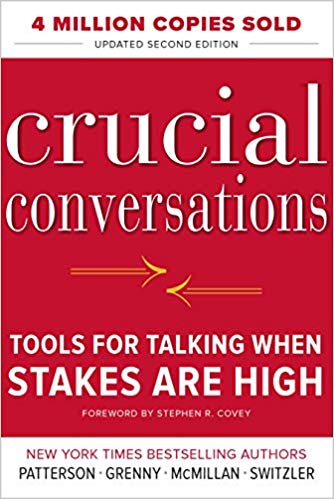

This article is an excerpt from the Shortform summary of "Crucial Conversations" by Kerry Patterson. Shortform has the world's best summaries of books you should be reading.
Like this article? Sign up for a free trial here .
What does it mean to know your heart? How does it apply to having crucial conversations?
“Know your heart” refers to knowing your intent in a conversation and maintaining self-awareness. You cannot fully communicate with another person and have a true crucial conversation if you don’t know your heart.
What Does “Know Your Heart” Mean?
Learning dialogue skills starts with diligent self-examination because if you don’t understand yourself, you can’t be fully effective at dialogue. This means you need to know your heart.
In crucial conversations, you’ll revert to tactics you grew up with (debate, silent treatment, manipulation, etc.). You need to understand your tendencies in order to counteract them and learn new skills.
You also need to be able to see how you’re contributing to the problems you’re experiencing. In disagreements, it’s human nature to focus on what you think someone else is doing wrong. But when you focus on blaming or finding fault, you lose track of what you really want, to your detriment. To know your heart means you’re able to see your own issues, too.
For example, two children who get into a fight over who should be first to use the bathroom forgot their objective (using the bathroom) when they became focused on winning the argument. As a result, they prolonged their misery.
It’s important to begin high-risk discussions with the heart (with the right motives) and stay focused no matter what happens.
You do this by making two heart-based assumptions:
- First, you must know what you want, and despite temptations, stick with your goals.
- Second, don’t make fool’s choices (either/or choices). Rather than choosing between fight and flight, realize that dialogue is always an option.
Example: Greta the CEO
Here’s an example of how switching your motives unconsciously due to emotion can affect your ability to stay in productive conversation.
Greta, a corporate CEO, has been trying for months to get her top managers to cut costs, but they’ve been dragging their feet. During a crucial conversation on the problem, a manager explains frankly why progress hasn’t been made: Greta herself is the roadblock.
The manager explains that while Greta says she wants her team to cut expenses, everyone knows that she’s spending money building and decorating a new office for herself, which comes across as hypocritical. Greta responds to the manager’s honesty by tensing up, looking as if she is under attack, and starting to point a finger. Her motive has changed: She is no longer focused on cost-cutting but on reasserting her authority or worse.
When you come under pressure in a discussion, if you’re not alert to our emotions, you may forget your original purpose (understanding and solving a problem by creating a shared pool of information) and switch to winning, punishing, or keeping the peace.
- Winning: Winning is praised in sports, movies, and TV. We learn at an early age that we have to outdo/beat our fellow students, and get the teacher’s attention with the right answer. But the desire to win short-circuits dialogue. You start with the goal of resolving a problem, but as soon as someone challenges you, you switch your purpose to winning.
- Punishing. As your anger at being challenged builds, you may want to discredit the other person or put them in their place, again straying from your original purpose.
- Keeping the peace: When a conversation gets uncomfortable, you may withdraw or go quiet, choosing peace over further conflict. But you likely won’t avoid a negative result in the end. For example, had no one spoken up at Greta’s meeting for fear of conflict, the results would have been negative nonetheless: She wouldn’t have learned the real issue, and her managers would have continued to resist cutting costs.
Here’s how to stay focused on your original goals/motives for the conversation, and avoid getting sidetracked by a desire to win or by some other motive: Focus on what you really want, and refuse the fool’s choice.
Know Your Heart: Remember What You Really Want
In order to have a productive conversation, you have to know your heart. This is about more than just sticking to your guns; you need to get to the root of what you really feel and what you want, and make sure you stay aware of how your feelings in the moment may affect your judgment.
1. Reboot
Stopping and asking yourself a question can redirect your thinking when heat starts to build — for instance when someone strongly disagrees with you. Stop and remind yourself of what you really want. Then ask whether you’re starting to change your goal to something else. What you’re feeling and doing are clues. Under the influence of adrenaline, your motives change without conscious thought.
Once you zero in on your shifting motives you can choose to change them. Remind yourself of your original purpose (what you want from the conversation for yourself and others), then consider how you should behave to achieve your purpose. Ask yourself, “how should I behave, if I actually wanted my results?”
2. Stay on Track
Taking the wrong path can be tempting. You may try to pick a fight, or succumb to your ingrained desire to win. Again, remind yourself of what you’re trying to accomplish in the conversation, and stay on track.
3. Be Aware of Your Body
While you’re looking at someone else’s body language, if you know your heart, you’ll also be aware of your own. Under pressure, your body reacts. If you catch this happening, you can switch your brain from a fight or flight response to problem-solving mode. When you pose a demanding question, your body sends blood to the brain to help you think and away from the parts of the body that prep for fight or flight.
Asking questions about what you want reminds you of your goal and resets your brain in a way that helps keep you focused on dialogue.
“Know your heart” means you have to be aware of how you’re communicating, and be sure about what you’re trying to say. It takes practice and reflection to learn how to know your heart, but it will help carry you through all the difficult and crucial conversations in your personal and professional life.

———End of Preview———
Like what you just read? Read the rest of the world's best summary of Kerry Patterson's "Crucial Conversations" at Shortform .
Here's what you'll find in our full Crucial Conversations summary :
- How to approach an argument without getting mad
- The mistakes most people make when trying to listen to someone else
- How to come up with win-win solutions that make everyone happy






